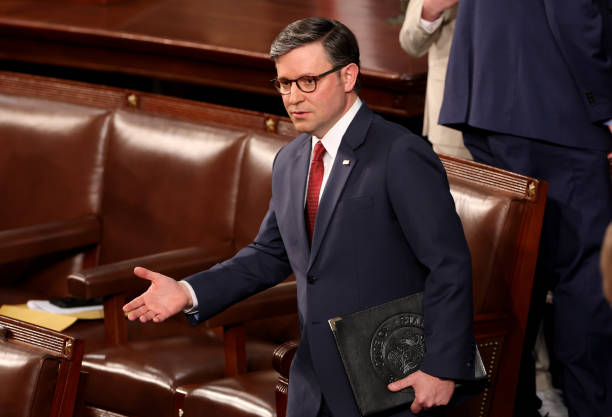As the 119th Congress convenes, all eyes are on Rep. Mike Johnson’s bid to secure his position as Speaker of the House. President-elect Donald Trump took to Truth Social to throw his weight behind Johnson, calling him a “fine man of great ability” and urging Republicans to rally for him.
The stakes couldn’t be higher. Johnson, whose term as speaker ended at 11 a.m. ET, needs nearly unanimous GOP support to clinch the gavel.
With Republicans holding a narrow 219-215 majority, every vote counts. If all 434 House members are present and every Democrat supports Rep. Hakeem Jeffries, Johnson will need at least 218 Republican votes. This slim margin leaves no room for dissent within the party.
The challenge is further complicated by Republican Rep. Thomas Massie of Kentucky, who has openly stated he will not back Johnson. Should Massie and even one other Republican defect, Johnson’s chances would evaporate.

Mike Johnson’s speaker bid underscores the GOP’s razor-thin House majority and unity challenge.
This precarious situation comes after a turbulent period in GOP leadership. Johnson was elected speaker on October 25, 2023, after weeks of internal strife following the ousting of then-Speaker Kevin McCarthy.
McCarthy’s short-lived tenure—just nine months—was marred by deep divisions within the party, culminating in his removal by a coalition of discontented Republicans and Democrats.
Trump’s endorsement signals the former president’s continued influence over GOP politics, particularly in shaping leadership. Trump characterized a win for Johnson as a victory not only for the Republican Party but also as a “big affirmation” of the broader MAGA agenda.
The upcoming vote will serve as a litmus test for the GOP’s ability to navigate its internal fractures. Should Johnson prevail, it could signal a step toward greater party cohesion. If he fails, however, it may mark the beginning of another protracted leadership battle, further exposing the vulnerabilities of the GOP’s slim majority.
